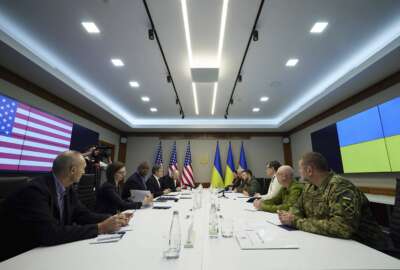On Capitol Hill, a deepening commitment to keep arms flowing to Ukraine
Ukraine and keeping aid flowing to that country, it's one of the few areas of bipartisan agreement on Capitol Hill.
Best listening experience is on Chrome, Firefox or Safari. Subscribe to Federal Drive’s daily audio interviews on Apple Podcasts or PodcastOne.
Ukraine and keeping aid flowing to that country, it’s one of the few areas of bipartisan agreement on Capitol Hill. Lawmakers returned this week and that’s at the top of the agenda. The Federal Drive with Tom Temin got more details from WTOP Capitol Hill correspondent Mitchell Miller.
Interview transcript:
Tom Temin: And Mitchell, am I right, that’s going to be top of the agenda?
Mitchell Miller: Absolutely. This will be no doubt the immediate focus of Congress this week as the Senate and House returned from their two week break. The Biden administration indicated last week that the original package of $14 billion that Congress approved is starting to get close to running out, believe it or not. You also have the Ukrainian Prime Minister meeting with House Speaker Nancy Pelosi and congressional leaders last week, thanking for the U.S. for what’s already been approved, but pointing out that Ukraine still has large needs related to the military, humanitarian aid and sustaining its own economy. So while the president announced more than $1 billion in assistance last week, $800 million for military, another $500 million related to the economy, this is going to definitely be a top priority for lawmakers and both Republicans and Democrats, as you indicated, are fully on board saying the flow of military weapons including ammunition, heavy artillery, javelins, stingers, drones, that all needs to keep coming to give Ukraine the tools it needs to keep fending off the Russians.
Tom Temin: And one of the commentators on one of the cable networks, I forget which one or who but said something interesting and one is that in the new region in which the intense fighting is happening, the United States have the long supply chain, and Russia has the short distances involved. And that’s a reversal of what it was earlier in the war.
Mitchell Miller: Right, that’s been an undercurrent of a lot of discussion here on Capitol Hill, especially people who serve on the Armed Services committees. You have literally all the way from the West, you know, out toward Lviv, and the eastern front of the U.S.-NATO allies, they have to move all of that equipment all the way across the country beyond Kyiv, all the way down to the Donbass region. That is a huge logistical challenge for NATO for the United States and of course, for Ukraine. And as you point out, the Russians just have a short distance. On the other side, they are further to the east, obviously, to get down to Donbass. So there’s a lot of discussion about actually getting this military equipment across the country. And some of the people have also talked about the fact that, is their concerns that the military equipment that the U.S. sends could somehow get in the wrong hands and get in the hands of the Russians. Of course, that’s happened in the past in various military conflicts so members of Congress are watching that as well. So there’s an attempt to try to make sure that this equipment gets to where it’s supposed to go. Also, the White House announced last week that it had appointed a retired three-star general, Army Lt. Gen. Terry Wolff, to help coordinate all of this influx of military assistance to Ukraine because that’s, again, a big concern.
Tom Temin: Interesting, but I guess in Congress, there is bipartisan feeling that this is really important to the American public, which maintains a high degree of outrage over what’s going on.
Mitchell Miller: Right, even though there’s obviously a lot of concern with inflation and the amount of money being spent by Congress, this is one area where Republicans and Democrats have really come together. However, there is a lot of complication related to this funding. If I can just move ahead to the COVID funding, which as you know, has not been approved, the Senate is still trying to get a $10 billion agreement on that package. And this is where things get complicated. Senate Majority Leader Chuck Schumer has indicated he wants Ukraine aid and COVID funding to be linked together. That could be a real problem. Despite a tentative agreement earlier on COVID. Republicans have a lot of reservations about another massive COVID package. And they say they won’t vote for COVID unless they get a vote on an amendment to block the Biden administration’s plan to drop Title 42 restrictions on migrants. So all of this is about to smash in together and we’ll have to see how it’s going to be sorted out, if they are able to extricate if you will, the Ukraine military aid, which I have a suspicion will happen because there’s so much pressure on lawmakers to get that money out that they don’t want it stuck over the next few weeks or months. Sort of like a big political Rubik’s Cube. Exactly. And there’s a lot of moving cubes. And a lot of these people don’t know quite how to fix that Rubik’s cube or get it to where it’s supposed to be.
Tom Temin: We’re speaking with WTOP Capitol Hill correspondent Mitchell Miller. And the other big topic is the IRS which is struggling through the post Filing Season Processing. And we all know leftover paper responses from last year and a bunch of new paper coming in this year, etc, etc. And there’s a big ask from the Biden administration to to help the IRS but that’s not going exactly swimmingly either on the Hill.
Mitchell Miller: No, it really isn’t Republicans. The Democrats do agree the agency is a mess, but they do not agree on whether it should get the $80 billion the president wants for the agency. I followed this House hearing last week that was led by Virginia Congressman Gerry Connolly. As you are well aware, he has had a keen interest in this as the chair of the Government Operations Subcommittee, and this hearing just laid out all of the issues that are facing the IRS right now. IRS Commissioner Charles Rettig, as he has in the past has indicated this agency does have a lot of challenges. It has a huge problem with hiring. It has a huge problem with trying to get all of this computer equipment that goes back to the 1970s updated. But Republicans indicated that they are not ready to spend this kind of money even though they acknowledged there are problems, including the ranking GOP member of the subcommittee Jody Hice, who just said we’ve got to look at ways to get the agency more efficient. But just to give people an idea of some of the challenges that the IRS and taxpayers face, at one point during this hearing Charles Rettig noted that during the pandemic, and this was a while ago, but at one point, the IRS had more than 20 million pieces of mail that had never even been opened. And obviously, millions of taxpayers still file by paper, even though the vast majority do it over computers. And that paper backlog as you well know and Federal News Network has pointed out over the years has really just stacked up literally for the agency. So they’re still trying to figure out exactly what they can do. Now Rettig does say they have made some major progress. And they are getting closer to a real time response from week to week and month to month. But there are still just so many problems within the IRS.
Tom Temin: And another question I wanted to ask you about and this is kind of comical, but kind of not. And I think last week on Wednesday evening, you were on Capitol Hill. I was at Nationals Park watching the parachutist from the Army’s Golden Knights come down. You were at the place where they were evacuating because of a seemingly rogue aircraft. And is Congress going to find out like, even though they weren’t there, but their staffers all had to evacuate, what the heck happened here?
Mitchell Miller: Yeah, isn’t it interesting that we were both in this these key points. Inside the Capitol, it was a little after 6:30 that evening, and we got the massive sounds of buzzers and screeching in here that goes off with everybody being told to flood out of the Capitol. Those that were here. As you point out there were fortunately, not that many people here. But U.S. Capitol police made it very clear, you had to get out of here immediately. Quickly, it became clear that this was going to be something that was not a threat. In fact, I happen to look up into the sky and I actually saw that plane that you saw over the stadium, but I saw it a short distance away as people were trying to figure it out. But right now, a growing number of House lawmakers are looking to start an investigation into what kind of problems with this communication snafu occurred, especially when you consider that Jan. 6 wasn’t that long ago. People just can’t believe that this would happen at this point. The FAA has effectively acknowledged that the problem was on its end, the Army has said it went through all the protocols. The U.S. Capitol Police said they were not notified. So first we’ll start with the FAA’s internal investigation and we’ll see whether that satisfies lawmakers. If it doesn’t, then it is potential that there could be a hearing on this.
Tom Temin: Interesting because it was, the comical sense was the military leaders from all the four major branches, where they’re throwing out ceremonial pitches, all of the leaders for the National Capital Region for the Navy, the Army, the Marine Corps, the Air Force, and you wonder which one of them should have made the call if any of them?
Mitchell Miller: Right, yeah, I mean, it’s almost incomprehensible that this could happen after Jan. 6, frankly, because there’s been so much attention, as you will know, about getting communication, clear lines of communication between everybody related to this. And this is not something that just happened, a couple of days ahead. I mean, as you know, these are planned months in advance and Military Appreciation Night, I mean, everybody knew, all the military branches knew that this was going to happen. So the idea that this caused this panic for just granted only about less than half an hour still is pretty amazing to a lot of lawmakers who are who are still scratching their heads about this.
Tom Temin: And topped off with an 11-2 loss by the Nationals at the hands of the Diamondbacks.
Mitchell Miller: Cherry on top, right?
Tom Temin: WTOP Capitol Hill correspondent Mitchell Miller thanks so much
Mitchell Miller: You bet.
Copyright © 2024 Federal News Network. All rights reserved. This website is not intended for users located within the European Economic Area.
Tom Temin is host of the Federal Drive and has been providing insight on federal technology and management issues for more than 30 years.
Follow @tteminWFED






